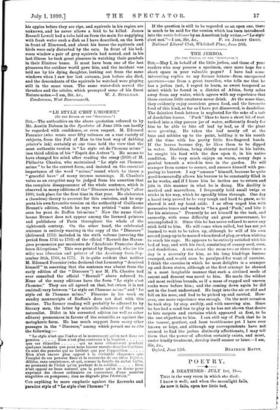"LE STYLE C'EST L'HOMME."
[TO THE EDITOR OF THE "SPECTATOR."]
SIR,—The authorities on the above quotation referred to by Mr. Austin Dobson in the Spectator of June 24th can hardly
be regarded with confidence, or even respect. M. Edouard Fournier (who wrote over fifty volumes on a vast variety of subjects, from the Fall of Man to the best way of dabbing printer's ink) certainly at one time held the view that the most authentic version is "Le style eat de l'homme meme " (see third edition of his "Esprit des Antres "). He seems to have changed his mind after reading the essay (1859) of M. Philarete Chasles, who maintained "Le style est l'homme meme " to be the correct form, and insisted on the essential importance of the word " meme," round which he threw a "graceful haze of many intense meanings. M. Chasles's value as an exegetist may be judged from his assertion that the complete disappearance of the whole sentence, which is observed in many editions of the " Discours sur le Style " after 1800, took place for the first time in that year. He elaborates a (baseless) theory to account for this omission, and he sup- ports his own favourite version on the authority of Guillaume Brunet's edition, which he says was printed "sans donte sous les yeux de Buffon lui-meme." Now the name Guil- laume Brunet does not appear among the licensed printers and publishers of Paris throughout the whole of the eighteenth century. On the other hand, the celebrated sentence is entirely wanting in the copy of the " Discours " (delivered 1753) included in the sixth volume (covering the period from 1745 to 1761) of the official " Recueil des Haran- gues prononcees par messieurs de l'Academie Franeoise dans tears Receptions." This was printed by Regnard, who (or his wife) was librarian and printer of the Academy from Sep- tember 30th, 1760, to 1772. It is quite evident that neither
M. Edouard Foamier (who declared that Lemontey "deceived himself" in asserting that the sentence was absent from the early edition of the " Discours ") nor M. Ph. Chasles had ever consulted the official " Recueil " above referred to. None of the many editions have the form "Le style c'est l'homme." They are all agreed on that, but (when it is not omitted) vary between "Le style eat l'homme inhue" and 'Le style eat de l'homme meme." Flourens in his work on sundry manuscripts of Baffon's does not deal with this matter. The former reading will probably be adhered to by literary men, the latter by scientific admirers of the great naturalist. Didot in his corrected edition (as well as other editors) pronounces in favour of the scientific as against the metaphoric form. He has much support from many other passages in the " Discours," among which permit me to cite the following :— " Le style n'est que Polars et le mouvement qu'on met dans ses
pensees lien n'est plus contraire la lumiere
que ces etincelles . qui ne nous aluttissent pendant quelques instants qua pour nous laisser ensuite dans lea tenebres.
Ce sont des pensees qui ne brillent que par l'opposition lien n'est encore plus oppose I la veritable eloquence que remploi de ces pewees fines et la recherche de ces idies 1Cgeres, &Hoes, sans consistance, at qui, comme la feuille du metal battu, as prennent de reclat qu'en perdant de la solidite Rien n'est oppose au beau naturel que la Paine qu'on se donne pour exprimer des choses ordinaires on communes d'une maniere singuliere on pompeuse; rien no degrade plus l'ecrivain."
Can anything be more emphatic against the fireworks and paradox style of "Le style (gest l'homme" P If the question is still to be regarded as an open one, there is much to be said for the version which has been introduced into the varim lectiones by an American lady writer,—" Le style















































 Previous page
Previous page